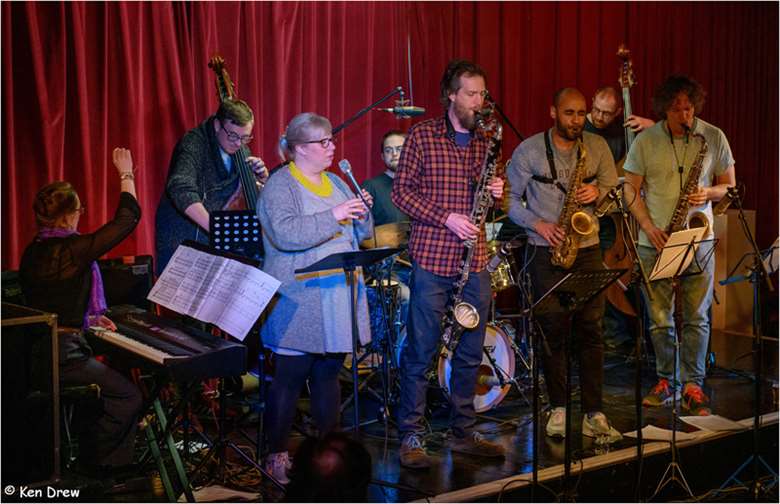Metamorphic Rock Reflective Modes At Newcastle's Black Swan
Thursday, March 28, 2019
“I am the person I know best.

.. it will be better in the knowing.” This refrain, which recurs throughout pianist Laura Cole’s composition ‘The Two Fridas’ could well serve as the key to much of her music, an intensely personal distillation of her emotions and experiences as a woman, a mother, and creative artist. Many of her compositions are built around spoken passages, her own poetry and found texts which have significance for her, integrated into and expanded by the instrumental writing and improvisations delivered by her intensely sympathetic octet – as much a community as a band.
This personal dimension, and the shape-shifting trajectory of the compositions, makes for music that demands – and richly rewards – close attention, and it’s no surprise that uniformly enthusiastic reviews of Metamorphic’s double-album (of which ‘The Two Fridas’ is the title-track) have nonetheless been peppered with caveats such as “significant demands on the listener” and “a difficult listen at times”.
But any fears that this live performance would be a daunting experience for the audience were very quickly dispelled. Even though the first set began challengingly with one of the more abstract pieces, ‘Cellular’, a largely spontaneous interweaving of four melodic motifs, this actually served to focus the attention of the listeners, and the transition to the more rhythmically urgent ‘Senken’ saw the energy and enthusiasm of the musicians connecting with an impact which was visceral and cerebral in equal measure. Subsequent offerings maintained that same balance between gripping introspection and animated celebration; even the lengthy suite-like piece ‘Digging for Memories’, inspired by Cole’s visit to Auschwitz, moved through atmospherically reflective passages to a rousing, almost joyous, climax that seemed to affirm the triumph of hope over evil.
In fact the music – mainly from the pen of Cole, apart from two short pieces by Seth Bennett and Peter Fairclough - was admirably served throughout by all of the players. The three horn section of John Martin (tenor), Chris Williams (alto) and Tom Ward (bass clarinet) were tight and punchy in scored ensemble passages, and unfailingly imaginative when seizing their improvisational opportunities. The same could be said of Kari Bleivik, whose expressive delivery of most of the texts, interspersed with seamlessly integrated wordless vocals, made her effectively a fourth frontline instrument. The two bass team of Seth Bennett and John Pope – the latter making only his second appearance as a dep for Ruth Goller, but handling the material with confident panache – laid down a foundation that was simultaneously firm yet elastic, while Johnny Hunter didn’t so much drive proceedings (the term would be too suggestive of an obtrusive dominance) as respond to changes in direction in a manner that enhanced his growing reputation as one of the most fluid and versatile kit drummers on the UK scene.
And throughout it all Cole’s own keyboard playing was a vital ingredient, much of the time unobtrusively nudging and steering the music, but demonstrating impressive fluency and imagination in her rare solo contributions. But individual excursions are really not the point in music of this nature; this is essentially a collective, ensemble endeavour, exploring the interface between composition and improvisation, and embracing the potential of the leader’s exquisitely crafted yet open charts. And on those terms this was a magnificent and memorable performance.
And one final bonus. Following the gig I went back to the double-album with renewed pleasure and, yes, enhanced understanding. The two performances – recorded and live – seem to me to be complementary expressions of Laura Cole’s ambitious and deeply considered music, each casting light on the other. One really couldn’t ask for more.
– Paul Bream
– Photo by Ken Drew